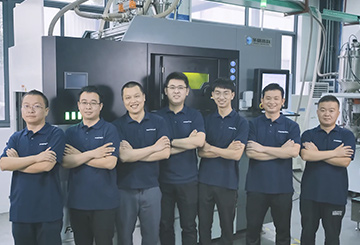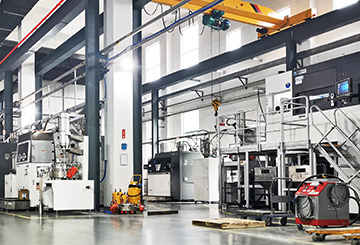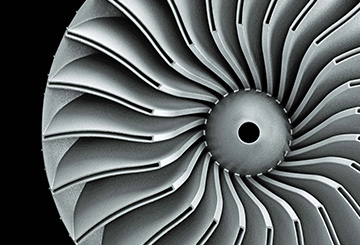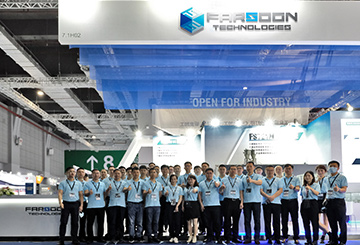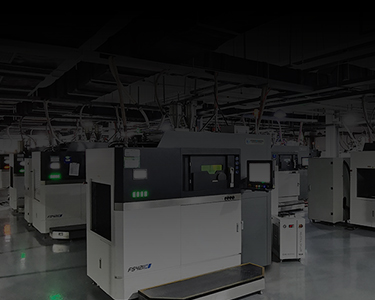In June 2020, leading Chinese aerospace additive parts supplier Falcontech first released plans for their Super AM Factory model with a targeted 50 metal additive systems, amongst which most are large-format platforms. By the end of October 2020, Falcontech has so far received its 24th Farsoon metal system, fulfilling their 2020 expansion ahead of schedule.
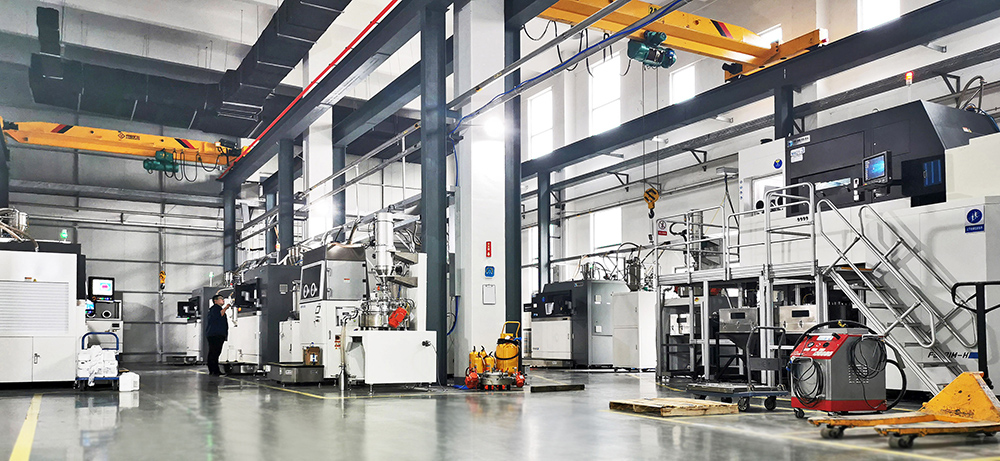
(Figure 1) Falcontech Super AM Factory with currently 20 Farsoon metal 3D printing system. Photo courtesy: Falcontech
The successful adventure of Falcontech is an intriguing example of the niche-markets, in-depth applications, and large manufacturing capacity metal additive manufacturing can achieve in such a short amount of time by a dedicated team of industry pioneers.
In this article, Mr. Shen Yulan, General manager of Falcontech, and Mr. Li Wei, Sales Director of Falcontech introduces the background and mindset of the company, and their technological road map connecting all components of metal additive manufacturing to achieve large scale productivity.
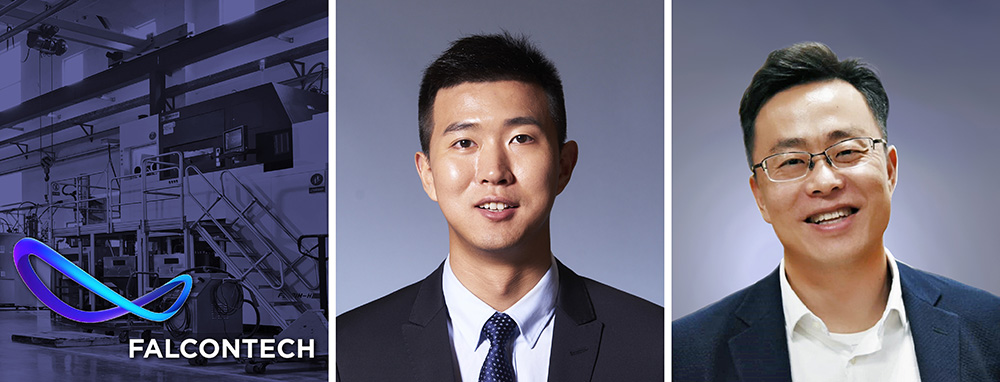
(Figure 2) Falcontech management group member: Mr. Shen Yulan, Founder and general manager of Falcontech (mid) and Mr. Li Wei, sales director of Falcontech (right) Image courtesy: Falcontech
The Emerging Markets
Compared to the rapidly expanding 3D metal printing market in China today, in the early 2010s, even the term additive manufacturing itself remained a deep mystery for most of the market. Plastic laser sintering, as well as FDM and SLA technology, has some level of acknowledgements and application within rapid prototyping and the consumer products market, while metal laser melting industry technology in China remained at a very early stage in terms of material, machine, processing, and production.
Meanwhile, the demand for lean-manufacturing, especially in the civil aerospace and medical industry in China started to emerge. Key components development requiring more complex structures, fully customed solutions, and faster “design-to-manufacturing” iterations, kept challenging the established manufacturing processes like welding and molding.
Metal 3D printing remained a novel technology in China, however at the time Mr. Shen Yulan, founder and general manager of Falcontech had observed this emerging market as an ideal advanced manufacturing solution for high value-added applications.
Breaking the Grounds
With a background in automotive and metal alloys, Mr. Shen had intimate knowledge of a fully developed manufacturing chain and the lean margins of profit which went along with such a mature industry. Being one of the main shareholders of Yinbang Clad Material Co., Ltd, Mr. Shen had continuously explored new technologies and markets that can lead to the future of manufacturing. After seeing metal additive manufacturing being widely used in the European and American industries, Mr. Shen had full confidence to introduce and adopt industrial metal 3D printing in the Chinese market.
Established in August 2012, Falcontech is located in Wuxi city next to Shanghai. Taking advantage of the Yangtze Delta location, amongst the most developed industrial regions in China with a large pool of talent, Falcontech had gathered a technical team with solid backgrounds in metallurgy, material production, and additive manufacturing, with a clear vision of establishing an industrial-level metal laser sintering ecosystem to offer innovative solutions for the key aerospace and medical sectors.
Technical Roadmap & Clear Focus
In order to offer high-quality components and solutions for the aerospace and medical industries as well as other industries such as shipping, chemicals production, and automotive, Falcontech had set up a comprehensive, close-looped technical roadmap by establishing 3 main business units: Metal Powder, Metal additive solution, and Advanced Manufacturing, with the capability of metal powder development and production, application engineering, parts production, material processing, post-processing, inspection and standardizing.
“Falcontech has a clear mindset of technical roadmap focusing on metal additive production including material, processing, part production and post-processing. For manufacturing systems including material production lines and additive manufacturing systems, we chose to partner with the industry leaders. We believe that by combining our expertise and know how through a professional partnership is the best strategy to offer the high-quality solutions to the industrial additive market.” Says Wei Li, sales director of Falcontech.
Material is king
The first element of the metal additive manufacturing value chain, is material. However, before 2012, specific grade, high-end metal material powder in the Chinese market was heavily dominated by various international brands from Canada and Germany. However due to import regulations, specialized grade of metal powder purchasing can not meet the needs of processing development and large-scale parts production.
Falcontech realized the need for a sufficient supply of consistent, aerospace grade metal material as key to produce high-performance end-use components in civil aircrafts. In September 2012, Falcontech invested in an advanced EIGA material production line dedicated for Titanium alloy powder development and production under an inert environment. The smelting process is carried out without a crucible, the metal stream controlled by high-speed inert flow to break the bonding force between the liquid metal atoms to achieve separate atomization.
Taking Titanium alloy as an example — with intensive formula optimization and process development, Falcontech is able to produce CAAC certified, aerospace grade Titanium powder material with excellent repeatability, purity, sphericity and flowability, well suited for industry applications for additive manufacturing, HIP process, coating and metal injection molding.
By closely working with leaders in industries and research institutes sectors, Falcontech produced metal materials has been tried and trusted in both China and globally. With an annual yield of 90 tons, Falcontech’s Titanium material stands out as having top tier quality and a significant market share in the industry.
Nowadays Falcontech offers a total of 24 grades of titanium alloy, nickel-based alloy, cobalt chromium alloy, aluminum alloy and steel in a variety of particle sizes.

(Figure 3) Falcontech Titanium powder EIGA production line. Image courtesy: Falcontech
Deep-Dive into Chinese Civil Aerospace market
Being an early adopter of metal additive manufacturing in China, Falcontech had witness the rising of the civil aerospace industry, as well as the growth of its manufacturing ecosystem.
In 2013 Falcontech established a long-term partnership with COMAC, the leading civil aerospace manufacturer in China. Falcontech signed an important collaboration project on 3D printing titanium components to be used on the C919 aircraft. The COMAC C919 is a narrow-body twinjet airliner capable of carrying up to 168 passengers. This collaboration accelerated Falcontech to establish manufacturing methods to the standards required in the aerospace industry, for both materials and parts production.
“Standard is the key to pushing an advanced technology into a successful commercial product”, says Mr. Shen, “Industry standards in aerospace sector will best ensure the consistency, repeatability, reliability of the production quality.”
Falcontech has heavily invested in a consistent, large amount of aerospace-grade titanium material testing, additive processing development, parts production, post processing study for quality control data base build-up according to the certification of airworthiness. In 2014, Falcontech received AS9100C & ISO 9001: 2008 aerospace industry certification.
After years of hard work, in 2015, the COMAC project has come to a successful result: 28 metal 3D printed parts had been approved by COMAC and installed for operation on C919. This marks Falcontech as the first company to supply the metal additive manufacturing parts for civil airliners in China. As a leading metal additive manufacturing service provider, Falcontech has also become a qualified part supplier of COMAC and successfully supplied qualified parts to 6 C919 till today.
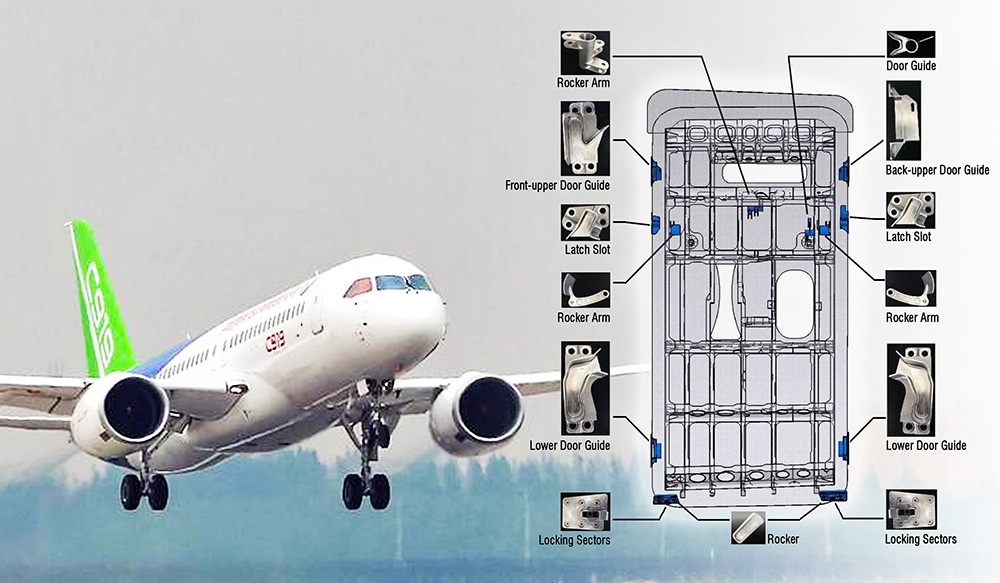
(Figure 4) COMAC approved Falcontech produced titanium parts installed on the cabin door of C919. Image Courtesy: COMAC, Falcontech
“Metal additive manufacturing has showing the potential of transforming the design-prototyping process in aerospace industry. Take the aerospace engine as an example, production of each component by traditional manufacturing takes more than 10 processes, 6-24 months due to the complicated structure. Additive manufacturing is able to simplified the manufacturing process and accelerate the iteration by 3-4 times. Now we are able to produce a brand-new engine prototype within 3 years, compared to previously 10 to 15 years by traditional process.” Says Mr. Shen.
A Bigger Picture:
“We have set up a phased technology and marketing plan at Falcontech to achieve our goal of metal additive industrialization,” Says Mr.Shen, “The first 5 year of 2012-2016 we focused on the material and technology research of metal additive manufacturing — we have heavily invested in a number of international industrial metal 3D printing brands for this process. We had carried out a number of tasks, including metal material formulation development and series production, material process engineering, testing our material on various metal platforms to ensure repeatable performance with multiple international brands of metal additive systems on the market. Also, from the very beginning, we started the process of material certification towards targeted industries and applications.”
As the first 5-year phase comes towards completion, Falcontech is now strategically looking at a bigger picture of entering true industrial manufacturing. Following the success of working on the C919 project, Falcontech has started small batch production of metal 3D printed parts for COMAC. With the estimated aircraft orders of COMAC, Falcontech started to gradually expand their manufacturing capacity of parts production, heat treatment, post-processing and advanced inspection.
On the other hand, Falcontech kept expanding their service and markets into medical and automotive industries, establishing new material portfolio including various grades of aluminum, nickel-based alloys, stainless steel and cobalt chrome powders. By working closely with industrial partners, Falcontech also acquired ISO13485 certification in the medical sector.
“Interesting enough, by end of 2016, the global additive market also accelerated with GE and Siemens entering the game,” says Mr. Li, “These changes also convinced us it was right to walk the line towards industrializing additive manufacturing production. This is when the idea of ‘Falcontech Super AM Factory’ came into the focus for our next 2017-2021 5-year development phase.”
Towards a Super AM Factory:
“In order to have a better understanding of ‘Industrial AM’ and better prepare ourselves for building this “Super AM Factory”, during 2017 and 2018, our core team has arranged multiple tours for market research, technical trainings and institutional exchange around the globe; expanding our team of experts from technology, sales and production sectors; Also, we kept investing in more value-added specific industry applications to develop deeper know-how in the industry.” Says Mr. Shen.
The “Super AM Factory” target for Falcontech, was to scale up metal additive manufacturing productivity, differentiated service capacity such as large format part fabrication, a streamlined industrial workflow, and most of all, to achieve a true economic manufacturing cost. With more than 7 years’ experience in operating metal machines from various international brands, Falcontech understands that better cost-performance is the key to expanding the applications of metal additive manufacturing. This goal can only be achieved by working with a local manufacturing partner.
“This partnership will require a much higher level of technical collaboration, customized build platform, higher degree of flexibility in parameter control, established process data base of various material degrees for quality control, lower cost of machine ownership and operation. In order to achieve this goal, we have to find a strong partner in the industry.” Says Mr. Shen.
After spending over a year in evaluation, Falcontech entered into a long-term partnership by significantly investing into Farsoon metal systems in 2019.
“We have a clear-thinking process when choosing the partner: firstly, we are looking for a strong leader in industrial AM with full competence of machine development and manufacturing that is able to offer quality products and solutions. Second, the ability of technology innovation based on a profound industry know-how, is able to develop customized solutions that can support Falcontech’s industrial scale production and differentiated service capacity. Finally, based on our wide range of application and industrial manufacturing capacity, we need a high level of technical support and fast-response service to ensure the high machine up-time to achieve an economic manufacturing cost.” Says Mr. Shen, “We were very lucky to find Farsoon as the right partner that can meet all our needs.”
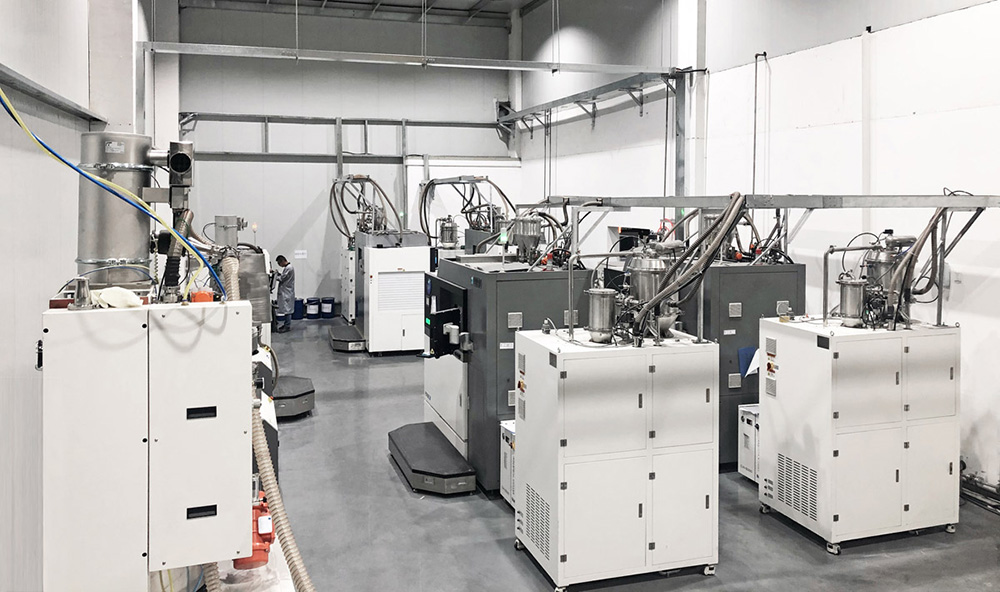
(Figure 5) Falcontech production floor with Farsoon metal systems including FS421M, FS301M and FS271M. Image courtesy: Falcontech
In June 2020, Falcontech publicly announced plans for their Super AM Factory initiative with targeted 50 Farsoon Metal systems. By October 2020, Falcontech had received its 24th Farsoon metal system, of which 22 are large-format Farsoon FS621M and FS421M systems –well on the way of their target expansion plan. With enhanced manufacturing capacity for series production, Falcontech has secured its place as a leading aerospace manufacturing service provider in both China and the global market.
Open, innovative Mindsets to grow together
“As our partnership develops, I found out Falcontech and Farsoon are similar in many ways,” Says Mr. Li, “Both companies are professional in their technology, while all have truly open mindsets to collaborate and grow together. Both of our R&D teams can work innovatively towards a technical solution in various contexts, e.g. machine adaption, software integration, parameter development, productivity optimization; this allows us to make fast response to the market needs. We are seeing more benefits and added-values brought by Farsoon’s open-minded, in-depth partnership, compared to the more conservative, less operationally flexible and slower technical solution iterations working with international brands.”
With the joint effort between Farsoon’s metal application team and Falcontech significant technical progress has been made including optimal productivity, thin wall structure as small as 0.5mm, improved dimensional-accuracy ±0.5mm/800mm, improved build surface roughness of Ra6.3 microns, and metallurgical quality control from Farsoon system produced parts.
Thanks to the “Open for Industry” philosophy of Farsoon machines, Falcontech is able to operate with a higher degree of flexibility in parameter setting and future material development, which contributes to a total of 20 material processing parameters for aerospace applications, including multiple types and grades of titanium alloys, aluminum alloys, and nickel-based superalloys. Farsoon’s application team also helped Falcontech with the establishment of processing data base for aerospace materials for future development and manufacturing quality control.
“The openness of Farsoon manufacturing platform is important for us in both material development and industrial scale production,” says Mr. Li, “Our material team can have better flexibility exploring different parameter combinations of laser power, scanning path, layer thickness and scanning speed, this is especially valuable when it comes to specialized super alloys materials development for high-end applications. During the large-volume series production, we can optimize the build speed by choosing a variety of layer thicknesses to improve the production yield. In compared to a closed additive system, Farsoon’s open platform will offer more benefits in the long run, allows more possibilities for specialized material and application development without any man-made technical restraints. It also encourages increasing technical exploration, software integrations for a more connected manufacturing eco-system.”
As leading companies in the industry, Falcontech and Farsoon also shared the responsibility to further push for advanced material & technical additive solution to the manufacturing market.
“Farsoon is a true partner for us rather than simply a machine supplier,” says Mr. Li, “With invaluable supports from Farsoon we are able to further explore a number of key applications and educate the potential markets about the advantages of additive manufacturing, all these cannot be achieved without an open mind.”
Think BIG
Amongst their current 24 Farsoon metal machine order for Falcontech Super AM Factory, of which 22 are large-format Farsoon FS621M (build platform 620 x 620 x 1100mm) and FS421 (build platform size of 425 × 425 × 420 mm) systems.
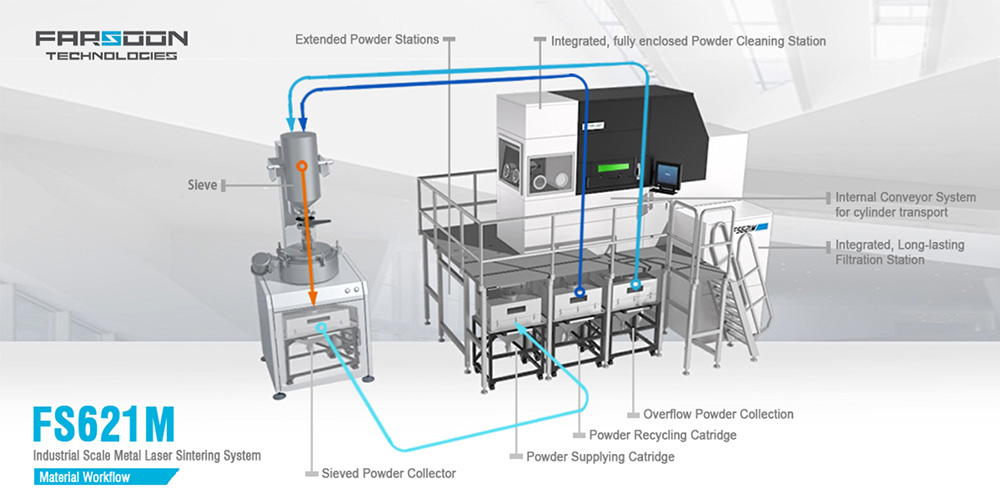
(Figure 6) Material workflow of FS621M. Image courtesy: Farsoon
Introduced to China market during TCT Asia 2020, FS621M is one of the outcomes from Farsoon & Falcontech product collaboration. The customized large-format metal system FS621M offers an industry leading build envelope, and extended build cylinder volume and maximum productivity per laser. Addressing the metal manufacturing challenges including productivity, size constraints, powder management, process control and factory layout, Farsoon developed the all-new FS621M by co-innovating with the Falcontech team. Created with a clear focus on a large build size with significant Z height, the FS621M features one of the largest metal laser sintering build volumes on the market, opening new possibilities for metal production that couldn’t be built before in industries such as aerospace, oil and gas, and many others.
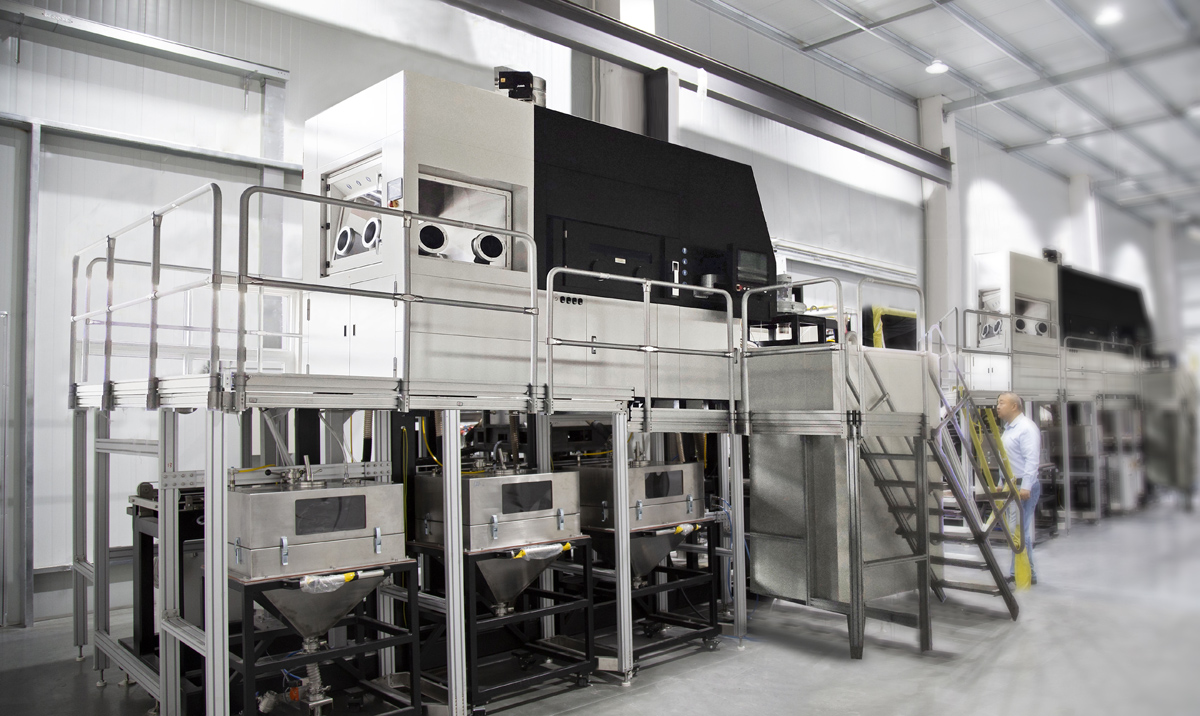
(Figure 7) Multiple FS621M system installed at Falcontech Super AM Factory. Image courtesy: Falcontech
As of today, the installation base of the FS621M system at Falcontech has reached a total of 4 systems for large-volume parts fabrication and batch production with multi-lasers. An increasing number of processing parameters have also been developed with Falcontech industrial powder materials on FS621M, including titanium alloys, aluminum alloys, nickel-based superalloys and stainless steels.
The FS421M system is the first metal additive solution under Farsoon’s CAMS (Continuous Additive Manufacturing Solution) concept. With productive multi-laser solutions and continuous production capacity, the FS421M has achieved accumulative sales of over 30 systems globally.
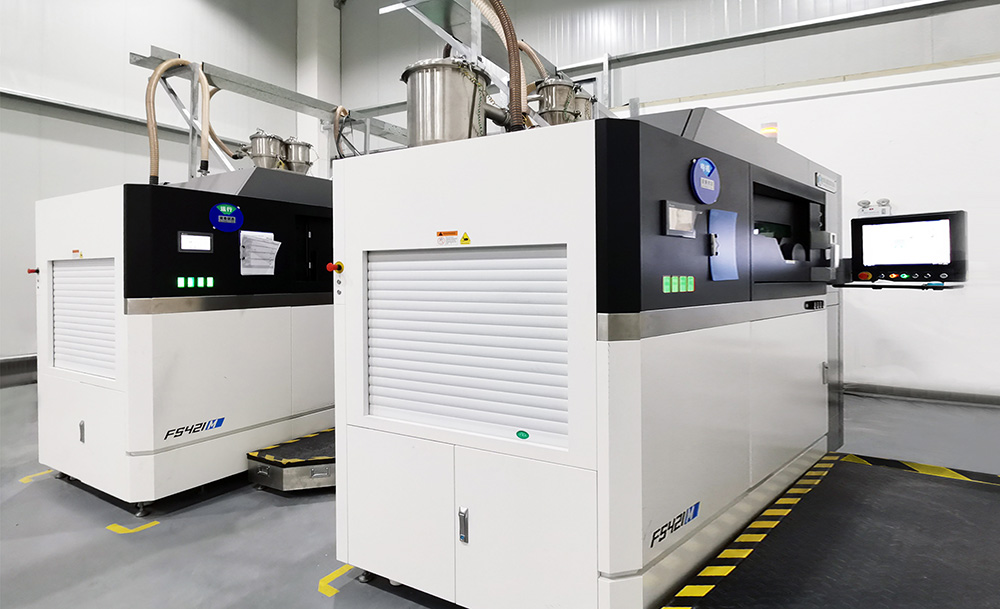
(Figure 8) Multiple Farsoon FS421M system installed at Falcontech. Image courtesy: Falcontech
“We see an exceptional performance and stability in the Farsoon FS421M metal system via multiple series production jobs since the installation,” says Mr. Li, “We are thrilled by the high-quality parts manufactured taking advantage of the benefits from Farsoon AM. With the increasing demand of manufacturing orders, Falcontech will further expand our production capacity and improve turnaround time for delivery with more Farsoon metal systems.”
These large-format system gives Falcontech an unparalleled, and unique production tool for large aerospace applications. With enhanced additive manufacturing capabilities Falcontech has succeeded in supporting the development and series production of spacecraft components in a number of key aerospace projects.
Innovative technical support and customer service for engineering excellence:
With the increasing demand of metal 3D printing in civil aerospace market, the Falcontech team has been met with engineering challenges from a wide range of specific applications.
Titanium alloys is an important application material for key aerospace components. With the strong internal stresses generated during the sintering process, Titanium alloys, especially TA15 parts tend to have internal defects like cracks or porosity, resulting in the failure of the part during functional test for mechanical properties. This risk becomes even more challenging when it comes to larger parts fabrication. Previously, although the Falcontech team had made significant investment into find a solution to ensure mechanical properties of larger TA15 parts, they were only able to successfully build small to medium sized parts due to limited access to customize processing parameters.
Now with a truly open Farsoon additive systems, Falcontech engineers were able to greatly improve their ability to customize a wide range of processing parameters for this specific material, especially in terms of the gas flow and laser power. Also, with the help of Farsoon’s application team, Falcontech was able to explore the combination of heat treatment process and specific processing solutions. Within a short span of time, Falcontech is now able to successfully produce over sized TA15 parts on both FS421M and FS301M systems with excellent mechanical performance. And what’s even better, with improved productivity.
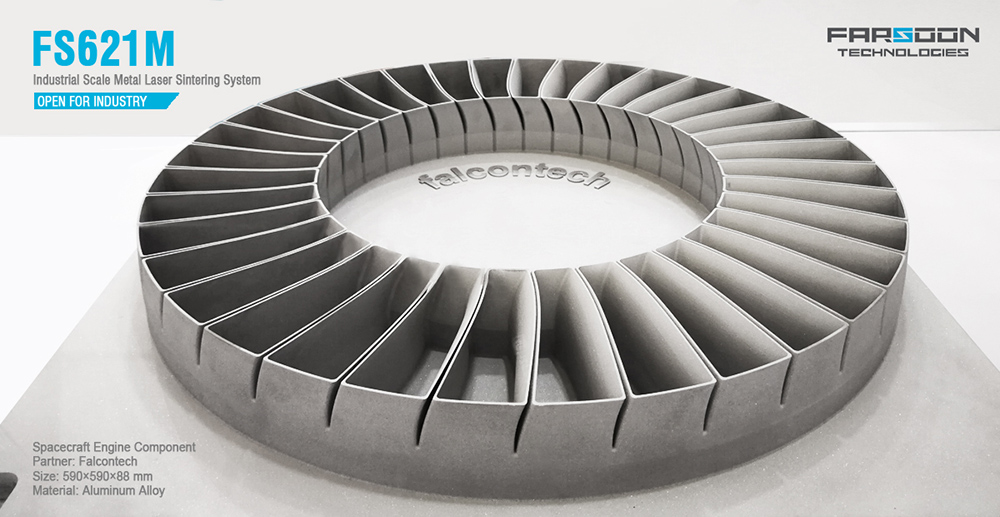
(Figure 9) Oversized aluminum engine component produced on FS621M. Image courtesy: Falcontech
As the machine installation base has reached 24 systems total, Falcontech has also received more projects with running almost full current manufacturing capacity. Farsoon service team has offered tailored customer-centric training & service plans.
During the beta-testing phase of the 4 installed FS621Ms, Farsoon had assigned a dedicated engineer at the Falcontech facility for training and ensuring machine up time. Farsoon also set up an on-site inventory at the Falcontech Super AM Factory, equipped with important consumable parts for the machines.
“We are impressed by the professionalism, efficiency and creativity of Farsoon’s technical support and service force,” says Mr. Li, “Farsoon has shown a real customer-centric mindset and understands the pain points of a service bureau. Innovative service plans like on-site inventory has improved our operational management, and minimize the machine downtime from parts ordering, payment and shipping.”
Falcontech’s Insight on the Chinese and global market:
Despite the influence of Cov19 during the beginning of 2020, Falcontech has seen signs of strong growth in industrial metal AM, and more opportunities opening up in China.
Besides the emerging Chinese civil aerospace industry, aviation sector also calls for increasing manufacturing needs in development and prototyping parts for manned aerial vehicles, satellites, and space vehicles. These advanced aerospace applications usually feature complex design geometries, making metal 3D printing a well-suited manufacturing alternative.
“We have seen an increasing number of industry giants from traditional manufacturing including automotive, machinery, heavy industry, shipping and molding industries in China, has started their evaluation and layout implementing metal additive manufacturing,” says Mr. Li
Starting from last year, a variety of metal additive technologies in China has received increasing capital investment and funding from the market to support their R&D and accelerating the industry development.
Mr. Li adds, “As for the global market, we have also observed a similar trend around larger-format production systems especially with a tall vertical height, multi-laser systems for increased productivity, and specialized high-temperature alloy materials.”
With the establishing of the Super AM Factory, Falcontech is empowered with over 20+ medium to large-format machines’ manufacturing capacity and unique ability of fabricating large parts.
“We are confident in offering an advanced metal laser sintering solution from quality materials, processing development, series production, post processing and inspection services to global partners.”
Inquires and customers interested are welcome to contact :info@falcontech.com.cn for more details!
About Falcontech:
Founded in August 2012, Falcontech is located close to Shanghai with a current manufacturing space over 12,000 square meters on 248 acres of land. Being one of the leading metal additive manufacturing service providers in China for aerospace industry with AS9100 certification, Falcontech is established with 3 business units including Metal AM Powder, Metal AM Solution and Advanced Manufacturing, Falcontech is able to offer high-quality components for aerospace, medical devices, shipping industry, chemicals and automobiles. Falcontech is a qualified supplier of COMAC metal additive manufacturing parts. Falcontech is equipped with an EIGA titanium alloy powder production line with an annual output of 90 tons of aviation-grade powder with CAAC certification.
About Farsoon:
Farsoon Technologies, founded in 2009 by Dr. Xu Xiaoshu, one of the true pioneers of laser sintering technology with more than 20 years’ experience in the industry, is a leading machine supplier of industrial Metal Laser Melting and Plastic Laser Sintering systems. Located in Changsha, Hunan Farsoon has developed a team of world-class experts with competencies in electrical/mechanical engineering, laser, scanning and optics, thermal controls, as well as material development and applications engineering. With clear vision of “Open for Industry”, Farsoon is committed to supporting industrial additive manufacturing with open systems, materials, parameters, and applications.
DOWNLOAD SUCCESS STORY

